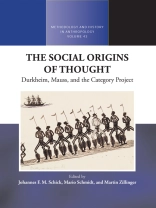By studying how different societies understand categories such as time and causality, the Durkheimians decentered Western epistemology. With contributions from philosophy, sociology, anthropology, media studies, and sinology, this volume illustrates the interdisciplinarity and intellectual rigor of the “category project” which did not only stir controversies among contemporary scholars but paved the way for other theories exploring how the thoughts of individuals are prefigured by society and vice versa.
विषयसूची
List of Figures
Introduction: The Durkheim School’s “Category Project”: A Collaborative Experiment Unfolds
Johannes F.M. Schick, Mario Schmidt, and Martin Zillinger
Part I: Silenced Influences and Hidden Texts
Chapter 1. Kantian Categories and the Relativist Turn: A Comparison of Three Routes
Gregory Schrempp
Chapter 2. Hidden Durkheim and Hidden Mauss: An Empirical Rereading of the Hidden Analogical Work Made Necessary by the Creation of a New Science
Nicolas Sembel
Chapter 3. Mana in Context: From Max Müller to Marcel Mauss
Nicolas Meylan
Chapter 4. Durkheim, the Question of the Categories and the Concept of Labor
Susan Stedman Jones
Chapter 5. Inequality Is a Scientific Issue When the Technologies of Practice That Create Social Categories Become Dependent on Justice in Modernity
Anne Warfield Rawls
Chapter 6. Experimenting with Social Matter: Claude Bernard’s Influence on the Durkheim School’s Understanding of Categories
Mario Schmidt
Part II: Lateral Links and Ambivalent Antagonists
Chapter 7. Freedom, Food, and the Total Social Fact. Some Terminological Details of the Category Project in “Le Don” by Marcel Mauss
Erhard Schüttpelz
Chapter 8. Durkheimian Thinking and the Category of Totality
Nick J. Allen
Chapter 9. Durkheimian Creative Effervescence, Bergson and the Ethology of Animal and Human Societies
William Watts Miller
Chapter 10. “It is not my time that is thus arranged…”: Bergson, the ‘Category Project’, and the Structuralist Turn
Heike Delitz
Chapter 11. “Let Us Dare a Little Bit of Metaphysics”: Marcel Mauss, Henri Hubert and Louis Weber on Causality, Time, and Technology
Johannes F. M. Schick
Part III: Forgotten Allies and Secret Students
Chapter 12. The Rhythm of Space: Stefan Czarnowski’s Relational Theory of the Sacred
Martin Zillinger
Chapter 13. La Pensée Catégorique: Marcel Granet’s Grand Sinological Project at the Heart of the “L‘Année Sociologique” Tradition
Robert André La Fleur
Chapter 14. Drawing a Line: On Hertz’ Hands
Ulrich van Loyen
Chapter 15. Between Claude Lévi-Strauss, Pierre Bourdieu and Michel Foucault, or: What Is the Meaning of Mauss’ “Total Social Fact”?
Jean-François Bert
Chapter 16. From Durkheim to Halbwachs: Rebuilding the Theory of Collective Representations
Jean-Christoph Marcel
Chapter 17. Durkheim’s Quest: Philosophy beyond the Classroom and the Libraries
Wendy James
Index
लेखक के बारे में
Martin Zillinger is Professor of Social and Cultural Anthropology at the University of Cologne. His major field research has been in Morocco on trance, ritual, and new media.












